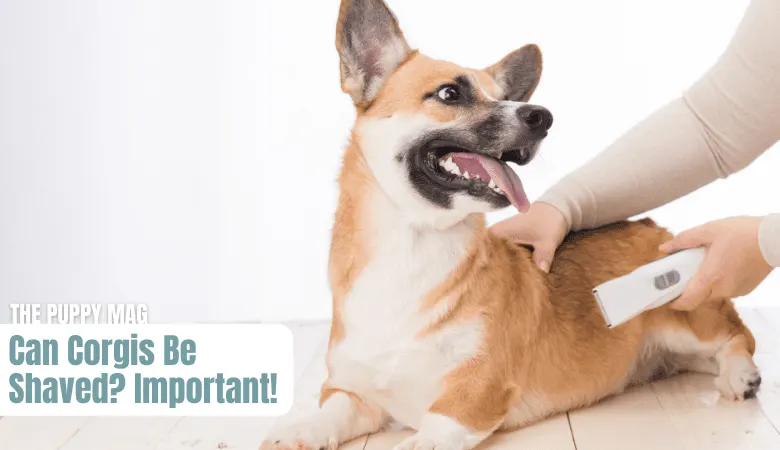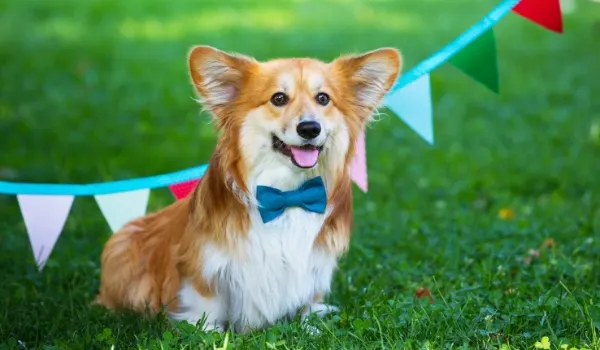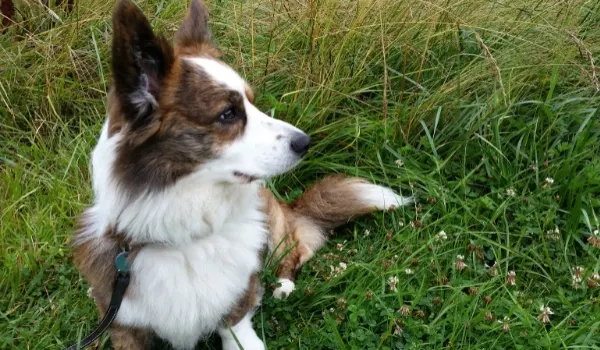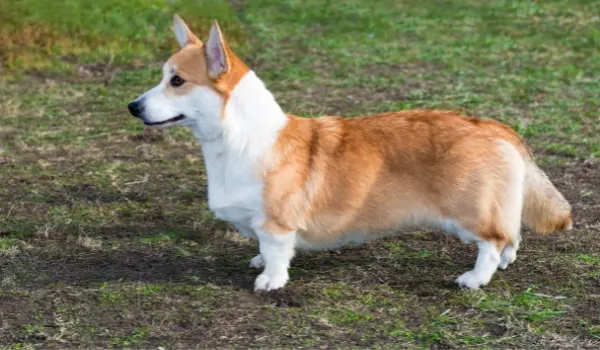Can your corgi be shaved? What about a light haircut for the summer? Are haircuts bad for their coat? These are all great questions that owners ask on a daily basis. This article will act as your complete FAQ guide on corgis and their coats.
The simple answer: Corgis should not be shaved for any reason other than a medical reason. Shaving can have many adverse side effects and the coat may not regrow properly.

Table of Contents
Shaved Corgis: What To Know
So what will likely happen if you shave your corgi? Thankfully, there’s an easy answer to this one:
Shaving back the coat extensively could cause the topcoat and undercoat to mat together when growing back. It can also reduce your corgi’s overall protection against the sun.
A light trim is okay and we’ll discuss that below. But as far as shaving goes, it’s a big no-no!
5 Reasons you should not shave a corgi’s coat:
- It can ruin how the topcoat and undercoat grow back for a very long time
- It can lead to constant matting and binding of the coat
- It increases the skin’s exposure to the sun and may result in sunburn
- It doesn’t help with shedding
- It makes it very hard to regulate body temperature
The last one on that list is a big one ^. One of the main reasons owners think to shave their corgi is to “help them remain cool”. While this makes sense, it doesn’t work like that!
The double-coat, despite looking toasty, actually plays an important role in protecting your corgi from sun exposure and allows her to effectively regulate her own body temperature. This all ties in with shedding and the role that each layer of the coat has.
Yep… That’s right, the double-coat actually helps your corgi remain cool, so the last thing we want to do is shave it off.
Do Corgis Need Haircuts?
So if shaving is off the cards, what about haircuts…
In a word, no. Corgis do not need haircuts, and in fact, their natural coat is just right for them. However, in some cases, a light trim or haircut may benefit your corgi.
A light haircut may not necessarily help your corgi feel any cooler (despite it seeming that way!) but it will likely make brushing and bathing easier for us. So that’s certainly a benefit.
Some owners prefer to keep the hair longer around the face, while lightly trimming the rest of the body. This will help keep your corgi clean and dirt-free, as having slightly shorter hair makes it harder for dirt to cling to.
The potential benefits of giving your corgi a haircut:
- Can help making bathing and brushing easier and more effective
- Can help keep your corgi clean when out on walks
- May slightly reduce shedding
Other than that, the truth is that there are no other major benefits to giving your corgi a haircut, apart from gaining some aesthetic differences if that’s something you are interested in.
Can You Give Your Corgi a Haircut at Home?
If you decide that a light trim is necessary for your corgi, the next thing is how to get it done… Is it an easy cut you can do at home? or does it still require a trip to the groomers?
It’s always best to take your corgi to a professional groomer, even if it’s just for a light trim or haircut. Knowing where and how to cut the hair is not straightforward.
If you were to cut the hair in the wrong direction, or too short in certain areas, it can be just as bad as shaving.
A professional groomer will also know the difference between the topcoat and the undercoat.
However, it’s true that *some* groomers, get a little carried away… So it’s crucial to specify with your groomer that you only require and want a very light trimming with scissors and that you don’t want the coat cut short or to be shaved.
But as far as doing it at home yourself, it’s not recommended.
Does Corgi Hair Regrow?
Hair that has only been lightly trimmed will usually regrow without issues. However, for corgis that have been shaved completely, hair will still likely regrow but with a strong chance of matting and binding. Here’s our full article on Corgi hair regrowth
Why does shaving cause mating?
Mating happens because the undercoat and topcoat grow back at different rates, yet are shaved to the same level. This causes the undercoat to grow through the topcoat (which it doesn’t naturally do), causing mating and tangling.
In general, it takes several weeks, if not a few months for your corgi’s fur to regrow back to where it was. Of course, this also depends on how much was taken off.
Hair growth is slow, but rest assured it will happen eventually assuming your corgi is in full health and doesn’t have a comprised immune system.
Regrowth problems is also why we do not recommend the FURminator for Corgis. (<< check that out)
Will Your Corgi Regrow Fluffier Hair?
As having a fluffy corgi is desirable to most, many owners want to know what will make their corgi fluffier.
The truth is that there isn’t a whole lot we can do to make the hair fluffier, not permanently anyway.
Cutting your corgis hair will not cause it to regrow fluffier. After the initial cut, if it’s done evenly, it may temporarily give the appearance of a softer and fuller look, but the hair itself will not regrow fluffier.
Fluffiness is partly down to grooming and diet, but mostly down to genetics. There are some corgis that are significantly fluffy (much more than normal), This, however, is due to carrying a recessive gene.
There’s such a thing as line brushing, which can sometimes help a corgi look fluffier. This is discussed in more detail in my other article: Why your corgi isn’t fluffy and what to do.
Corgi Shaved By Accident… What Should You Do?
If you’ve accidentally shaved your corgi, or the groomers got a little frisky with the clippers, what should you do?
First of all, don’t worry too much! Although shaving your corgi is not recommended, it’s not the end of the world if it happens once. As it regrows slowly, the coat will need special attention and plenty of careful brushing as it will likely try to mat and bind.
Brushing the coat regularly as it starts to regain some length will be very important. And the best brush for this will likely be an undercoat rake. In this instance, I would avoid the use of a de-shedder, as the teeth are too close together. The rake has enough space between the teeth to help detangle, instead of deshed.
The only other thing you can do is schedule an appointment with a groomer for further advice (perhaps a different one if it happened at the groomers!) or even consult your veterinarian about it.
Unfortunately, once it’s happened, it’s happened, and it will take a long time to regrow. Just try your best to avoid tangles and mating.
Oh, and be sure to prevent your corgi from sunbathing and being outside for too long if it’s hot. Your shaved corgi will only feel hotter, not cooler. And it’s crucial to avoid sunburn.
Corgi Coat Styles With Photos
Let’s take a look at some of the different looks and coat styles a corgi can have.
Pembroke Natural / Lightly Trimmed Coat:

Pembroke Naturally Long / Fluffy Coat:
(likely carries recessive gene mutation)

Cardigan Natural Uncut Coat:

Cardigan Lightly Trimmed Coat:

5 Tips For a Healthy Corgi Coat
Let’s run through some helpful tips to help you keep your corgi’s coat healthy and beautiful.
1. Avoid over-bathing
Although bathing is definitely necessary, it’s important to avoid over-bathing. Bathing your corgi too much will quickly strip her coat’s natural oils. This will dry out her skin and coat, making it dull, dirty, and eventually greasy. Bathe your corgi once every two months at the most.
2. Brush regularly
Being consistent with a brushing routine makes a dramatic difference to the health of her skin and coat. It’s admittedly something many owners don’t do as much as they should…(I’m guilty too!) Brush every other day, or even every day for 10 minutes at a time. Little and often is the key to managing shedding, removing dead hair, and spreading those healthy natural oils.
3. Omega-3 supplement
Using a high-quality fish oil supplement (omega 3) is something many owners do for general health and well-being. Omega 3 helps with brain function, heart function, improves the immune system, and makes the skin and coat strong, bright, and healthy. Although fish oil is generally safe, it’s advised to consult your veterinarian first. This is our favorite option.
4. Grooming wipes
You can either use doggy grooming wipes or simple baby wipes. Wiping down your corgi’s coat once a week will act like a mini-bath but without using shampoo. Although wiping doesn’t replace bathing it will do an excellent job of keeping the surface of her coat clean and shiny. It doesn’t take long and it’s absolutely worth doing!
5. Natural ingredient shampoo
The kind of shampoo you use can have a big difference in how her coat will look and feel after. Unfortunately, most dog shampoos contain harsh chemicals, alcohols, detergents, fragrances, parabens, and the list goes on… The only shampoo you should use is a natural-ingredient dog shampoo. These are infinitely milder and friendlier on the coat and will not strip those natural oils.
Last thoughts
Corgis should not be shaved. Shaving has many downsides and could potentially cause her coat to regrow improperly. Shaving the coat can lead to sunburn, and will not help your corgi remain cool in summer, in fact, it may even cause her to overheat.
Corgis can have haircuts and light trims, but it’s only optional and not a requirement for this breed. Light trimming may help with coat hygiene, grooming, and may have a positive impact on shedding.
If your corgi has been shaved by accident, you’ll need to pay very close attention to how her coat regrows. It will likely mat and tangle so frequent brushing will be crucial. It’s also best to visit the groomers to receive further help and tips.
⭐ Thank you for reading!
⭐ Back to more corgi articles >>>
